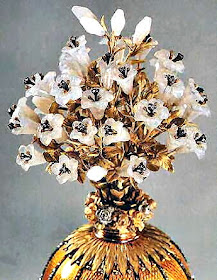This four colored gold egg shaped clock and it's pedestal are decorated with translucent yellow enamel on a guilloche background. The body of the clock is divided into twelve parts, outlined with diamond-studded stripes. The belt of the dial is enameled opaque white, with twelve diamond-set Roman numerals. This belt revolves around the egg, and the time is indicated by the head of an arrow in a drawn bow. A gold key was used to wind the mechanism.
The pedestal is decorated with rosettes and the year of it's creation set in diamonds.
On top of the egg sits a delicate bouquet of Madonna lilies, carved from onyx. The pistils of the flowers are set with three small rose-cut diamonds, and the leaves and stems are of tinted gold. The flowers sits in a vase decorated with gold roses. During this era the language of flowers was well known. The roses are symbols of love, and the lilies stand for purity and innocence.
The surprise from this egg is currently missing, but from contemporary photographs it is known to have been a ruby pendant with rose-cut diamonds.
The "Bouquet of Lilies Clock Egg" is one of few Imperial Easter Eggs that never left Russia. It was never sold, but transferred to the Moscow Armory Museum in 1927, where it is still kept.
PS. I got an anonymous comment on my post about the "Rosebud Egg". He/she stated that that egg is now in Christian Thomas Lee's art collection, with the small rose necklace inside! I'm so glad to hear some of the missing pieces from these eggs are found now and then! Maybe one day all the missing eggs are brought into public view again...



I adore the top of this one, it is so wonderful!! Happy Friday gorgeous girl xx
ReplyDeleteThis is probably my favourite egg you've posted so far, absolutely amazing Miss Meadows, I'd love to own this in Spring especially for some reason!
ReplyDeletePretty! :)
ReplyDelete